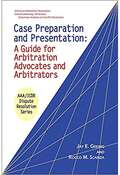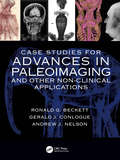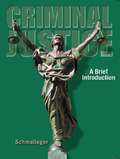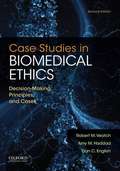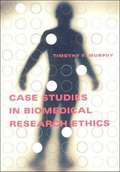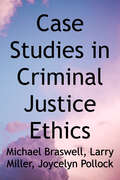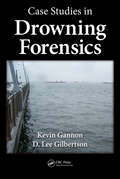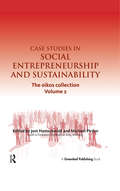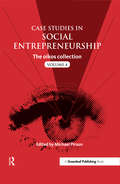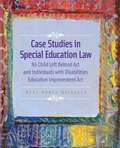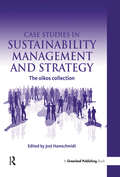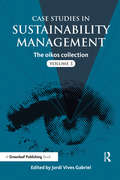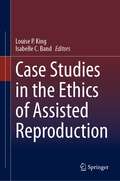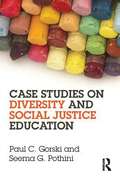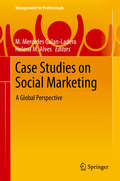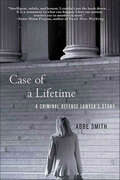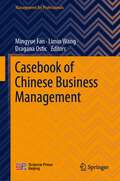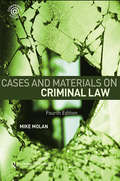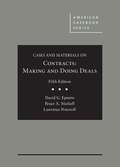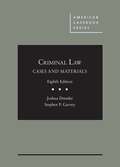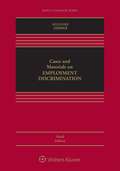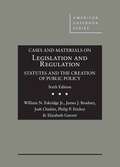- Table View
- List View
Case Preparation and Presentation: Guide for Arbitration Advocates and Arbitrators
by Jay E. Grenig Rocco M. ScanzaArbitration advocates uniformly place great emphasis on case preparation. Case Preparation and Presentation: A Guide for Arbitration Advocates and Arbitrators can be used to help prepare parties and their advocates in a wide range of arbitration cases including labor, employment and commercial arbitrations and will provide lawyers and non-lawyers alike with the focus and direction to maximize their chances of obtaining a good result in arbitration. <p><p> In this book readers will find coverage on the following topics: Developing a case theory and case theme Commencing the arbitration process Selecting an arbitrator and scheduling the hearing Evaluating and presenting evidence Preparing for the arbitration hearing Conducting the arbitration hearing Making and responding to objections Examination and cross-examination of witnesses
Case Studies In Criminal Justice Ethics (Second Edition)
by Larry Miller Michael Braswell Joycelyn PollockBuilding on the success of the popular first edition, the authors provide hypothetical criminal justice scenarios for analysis, having found in their experience as teachers that the process adds depth and dimension to the study of justice and ethics. This expanded second edition offers ten new cases addressing the intricate process of moral and ethical decision making. Focusing on both personal and social context, the authors explore true-to-life situations and encourage readers to think about the possible consequences that could result from the choices they make. The case studies provide realistic portrayals of current dilemmas in policing, courts, corrections, and juvenile justice. Political and noble cause corruption, perjury and judicial/prosecutorial misconduct, ethnic and gender prejudice, and many other social and criminal justice themes are featured. Following each scenario are thought-provoking questions to facilitate personal reflection and class discussion. Each section contains a bibliography of topical books and articles for readers interested in a more in-depth treatment of the issues.
Case Studies for Advances in Paleoimaging and Other Non-Clinical Applications
by Ronald G. Beckett Gerald J. Conlogue Andrew NelsonThe case studies provided in Case Studies for Advances in Paleoimaging will provide the reader with real-world scenarios and case examples that will help prepare researchers to discover new ways to apply the various modalities associated with the technology. This book is a follow-up to the Beckett and Conlogue’s classic work Paleoimaging (2009) and companion to their new contribution Advances in Paleoimaging (2020). The case studies outlined demonstrate the problem-solving nature of imaging research and the application of critical thought to unique problems. Further, Case Studies for Advances in Paleoimaging demonstrates the incredible depth of application of these modalities including photography, endoscopy, x-ray fluorescence, plane radiography, digital radiography, and advanced imaging modalities like multi-detector computed tomography, micro-computed tomography, and magnetic resonance imaging. Of particular note, case study seven, Contrast Media Injections, informs the researcher regarding methods to bring out specific anatomic structures that may be the target of a given research question. Intended for students, faculty, and seasoned researchers, Case Studies for Advances in Paleoimaging presents actual cases from the authors’ vast experience in the application of paleoimaging modalities in order to answer unique research problems. The book also serves as a field manual for current and future researchers as they approach similar or new cases that present unique challenges. These cases demonstrate how the varied imaging methodologies can provide data which greatly enriches our understanding of the subject at hand, be it ancient cultural remains, forensic recovery, museum holdings, or other anthropological and archaeological artifacts.
Case Studies in Abnormal Behavior
by Frank SchmallegerTopics discussed: anxiety disorders, sleep disorders, sexual disorders, delusional disorders, depression, substance abuse, violence, eating disorders, among others.
Case Studies in Biomedical Ethics: Decision-Making, Principles, and Cases
by Amy Haddad Robert Veatch Dan English<p>The most comprehensive and up-to-date collection of its kind, Case Studies in Biomedical Ethics: Decision-Making, Principles, and Cases, Second Edition, explores fundamental ethical questions arising from real situations faced by health professionals, patients, and others. <p>Featuring a wide range of more than 100 case studies drawn from current events, court cases, and physicians' experiences, the book is divided into three parts. Part 1 presents a basic framework for ethical decision-making in healthcare, while Part 2 explains the relevant ethical principles: beneficence and nonmaleficence, justice, respect for autonomy, veracity, fidelity, and avoidance of killing. Parts 1 and 2 provide students with the background to analyze the ethical dilemmas presented in Part 3, which features cases on a broad spectrum of issues including abortion, mental health, experimentation on humans, the right to refuse treatment, and much more. The volume is enhanced by opening text boxes in each chapter that cross-reference relevant cases in other chapters, an appendix of important ethical codes, and a glossary of key terms.</p>
Case Studies in Biomedical Research Ethics
by Timothy F. MurphyThis textbook for instruction in biomedical research ethics can also serve as a valuable reference for professionals in the field of bioethics. The 149 cases included in the book are grouped in nine chapters, each of which covers a key area of debate in the field. Some of the case studies are classics, including the famous cases of the Tuskegee Syphilis Study (in which subjects with syphilis were not given treatment) and the Willowbrook hepatitis studies (in which institutionalized subjects were intentionally exposed to hepatitis). Others focus on such current issues as human embryonic stem cell research, cloning by somatic nuclear transfer, and the design and function of institutional review boards. Each chapter begins with a brief introduction that places the issues raised in context; this is followed by a number of cases (each of which is no more than a few pages). Study questions meant to encourage further discussion follow each case. After an introductory discussion of the history and tenets of ethics in medical research, the book's chapters cover the topics of oversight and study design; informed consent; the selection of subjects; conflicts of interest; the social effects of research; embryos, fetuses, and children; genetic research; the use of animals; and authorship and publication. Following these chapters are appendixes with the texts of the Nuremburg Code and the World Declaration of Geneva, two key documents in the establishment of bioethical standards for research. Also included are a glossary, a table of cases by general category, and an alphabetical listing of cases.
Case Studies in Criminal Justice Ethics
by Larry Miller Michael Braswell Joycelyn PollockEthical conflicts rarely involve clear-cut choices. Decision making in ambiguous circumstances challenges personal values and professional ethics. The fog of politics, personal bias, and past experiences factor into the choices made. The goal of this compelling collection of cases is to stimulate reflection about the ethical dilemmas encountered in interactions. Thought-provoking case studies address police misconduct, protests and civil unrest, school resource officers, questionable prosecutorial practices, the challenges of a pandemic for prisons, the influence of politics, ethnic/gender/sexual preference bias, family conflict, immigration, perceptions of terrorism, and executing someone who may be innocent. <p><p>The experiential approach presents readers with opportunities to think about decisions they might have to make as criminal justice professionals. People employed in criminal justice have a great deal of power and discretion, which can be used ethically or unethically. Introductions to the sections on law enforcement, the courts, corrections, and juvenile justice provide background for analyzing the hypothetical scenarios. Case commentaries and questions provoke discussion about potential courses of action and the consequences of various choices.
Case Studies in Drowning Forensics
by Kevin Gannon D. Lee GilbertsonWhen a corpse is found in a body of water, authorities generally presume that the manner of death was either an accident or a suicide. They do not treat the recovery site as a potential crime scene or homicide, so many cases remain unsolved. Case Studies in Drowning Forensics investigates the cases of 13 bodies recovered from water in similar circu
Case Studies in Social Entrepreneurship and Sustainability: The oikos collection Vol. 2
by Michael Pirson Jost Hamschmidt Marina KimIn 2008, Ashoka launched the "Changemaker Campus Initiative" which applies Ashoka's rigorous criteria to select and support universities as they develop and implement a comprehensive social entrepreneurship plan. Through the lessons learned from this network, and with input from its broader global network of those experienced in the field, Ashoka aims to set a new standard for social entrepreneurship education. Indeed, despite the rising demand, there remains a dire need for quality coursework and global teaching case studies. Social entrepreneurs – and the pressing challenges they solve – are not bound by geographic borders or a single political environment, yet there is a lack of the materials necessary to equip students with the skills and mind-set required to catalyze systemic social change. What few high-quality case studies do exist typically highlight social entrepreneurs within the United States. This cooperation with oikos within the Social Entrepreneurship Track of the annual oikos Global Case Competition is a critical vehicle for tackling that challenge. As a result of this effort, more locally relevant case studies are being written, peer-reviewed, and judged than ever before, and are able to make their way into the hands of global audiences eager to adopt them into their courses. Building social entrepreneurship skills and problem-solving abilities are best practiced and honed using real-life examples and strategic challenges – not just learning theories in a vacuum. Case studies provide this exposure and real-time training in systemic problem-solving. Through these 15 teaching cases, students learn that social entrepreneurship is about identifying root causes of problems and applying a solution that tackles the system. As study upon study has shown, the band-aid approach does not work. To effectively address a social problem, the solution must continually adapt and evolve based on market feedback about what works and what needs to change in the model. Case Studies in Social Entrepreneurship and Sustainability is the second volume resulting from the oikos Global Case Writing Competition – an annual program launched in 2003 to promote the publication of high-quality teaching cases in corporate sustainability. This book expands the collection with award-winning global cases in the rapidly growing field of social entrepreneurship and sustainability. In view of the growing importance of various sustainability trends, management schools are increasingly challenged to adapt their entrepreneurship and business curricula. Management education needs to reflect the trends and provide a broadened understanding of value creation. Sustainability is a concept that demands that organizations consider the legitimate expectations of different stakeholders in their value creation processes. At the same time, it underlines the fact that many sustainability trends offer new business opportunities that entrepreneurs will seize. As a result, value creation processes need to be reorganized in order to create economic capital while developing social capital and preserving natural capital. Indeed, entrepreneurial organizations are increasingly dealing with these challenges. The case studies in this book explore both the opportunities and pitfalls entrepreneurs – working with organizations with for-profit, hybrid and non-profit business models – face in targeting sustainability issues and how their values and core assumptions impact their business strategies. They describe new patterns of value creation, new alliances, and the challenges of dealing with existing paradigms. It is clear that new ways of doing business with a common objective of maximizing social impact are substantially shaping markets and society. This textbook of competition-winning case studies for management education in the field of social entrepreneurship and sustainability provides excellent learning opportunities, tells engaging stories, deals with recent situations, includes quotations from key actors, is
Case Studies in Social Entrepreneurship: The oikos collection Vol. 4
by Michael PirsonThis book is an essential resource for the increasing number of facilitators who wish to help students learn about the promise and pitfalls of social enterprise. The oikos-Ashoka case competition for social entrepreneurship was conceived in 2007 as a way to help find great material and case studies in this emerging field. This fourth collection of oikos case studies is based on the winning cases from the 2010 to 2014 annual case competitions. These cases have been highly praised because they provide excellent learning opportunities, tell engaging stories, deal with recent situations, include quotations from key actors, are thought-provoking and controversial, require decision-making and provide clear take-aways. This new volume of social entrepreneurship case studies highlights cases from around the globe authored by teachers from around the globe. The selected cases span many industries and geographic contexts; nevertheless, they are connected by a shared ambition: to highlight the power of entrepreneurship to solve social problems. The cases are clustered in three different sections: Socially oriented Enterprise Cases – Health and Fair trade, Ecologically oriented social enterprises, and Corporate Social Entrepreneurship. Case Studies in Social Entrepreneurship will be an essential purchase for educators and is likely to be a widely used as a course textbook at all levels of management education. Online Teaching Notes to accompany each chapter are available on request with the purchase of the book.
Case Studies in Special Education Law: No Child Left Behind Act and Individuals with Disabilities Education Improvement Act
by Mary Konya WeishaarEighteen case studies capture important issues within the IDEA and NCLB legislations and provide real-life context for studying special education and the law. Topics include accountability; participation in high stakes assessment; the referral and pre-referral process; zero reject, child find and discipline; nondiscriminatory assessment; appropriate education and IEPs; least restrictive environment; due process; and parent participation. Readers will see a variety of students, issues and interventions (both best practice and less than best practice) and have opportunities to examine the legal issues and other issues behind each case.
Case Studies in Sustainability Management and Strategy: The oikos collection
by Jost HamschmidtWith the rapidly growing importance of sustainability and corporate responsibility in a globalised world, management schools are increasingly integrating long-term economic, environmental and social issues into their teaching and research. Climate change, poverty, labour standards and human rights are among the many topics that future decision-makers will need to face in their careers. Business education needs to reflect this new reality and provide a broadened understanding of value creation in order to create economic capital while developing social and preserving natural capital. Many sustainability trends also offer interesting new business opportunities that are ripe for entrepreneurial thinking. Case studies can be important tools for creating learning processes on different levels - students are forced to struggle with exactly the kinds of decisions and dilemmas managers confront every day. In this reflection of reality, the values and goals of the student are systematically challenged. This can be especially valuable in the context of sustainability and strategy - organisations are now continually forced to value the different aspects of sustainability and their interrelations: How do social issues impact the economic bottom line? How can an environmentally sound strategy create a positive impact on employee motivation and thus have measurable impact on economic performance? What comes first and why? But excellent case studies for management education in the field of sustainability management and strategy are rare. This innovative collection has been produced to fill this gap. It is based on the winning cases of an annual competition organised by oikos - the international Student Organization for Sustainable Economics and Management. So what makes an excellent case in sustainability management? These cases have been highly praised because they provide excellent learning opportunities, tell engaging stories, deal with recent situations, include quotations from key actors, are thought-provoking and controversial, require decision-making and provide clear take-aways. These cases explore both the opportunities and pitfalls companies and NGOs face in targeting sustainability issues and how their values and core assumptions impact their business strategies. They deal with a myriad of issues including supply chain management, stakeholder dialogue, social entrepreneurship, sustainable marketing, ethics, governance, the business case for sustainability, partnerships, purchasing and climate change. Case Studies in Sustainability Management and Strategy is an essential purchase for educators and is likely to be a widely used as a course textbook at all levels of management education. Online Teaching Notes to accompany each chapter are available on request with the purchase of the book.
Case Studies in Sustainability Management: The oikos collection Vol. 3
by Jordi Vives GabrielWith the rapidly growing importance of sustainability and corporate responsibility in a globalised world, management schools are increasingly integrating long-term economic, environmental and social issues into their teaching and research. Climate change, poverty, labour standards and human rights are among the many topics that future decision-makers will need to face in their careers. Business education needs to reflect this new reality and provide a broadened understanding of value creation in order to create economic capital while developing social and preserving natural capital. Case studies can be important tools for creating learning processes on different levels - students are forced to struggle with exactly the kinds of decisions and dilemmas managers confront every day. In this reflection of reality, the values and goals of the student are systematically challenged. This can be especially valuable in the context of sustainability management - organisations are now continually forced to value the different aspects of sustainability and their interrelations: How do social issues impact the economic bottom line? How can an environmentally sound strategy create a positive impact on employee motivation and thus have measurable impact on economic performance? What comes first and why? This third collection of oikos case studies is based on the winning cases from the 2010 to 2013 annual case competition. So what makes an excellent case in sustainability management? These cases have been highly praised because they provide excellent learning opportunities, tell engaging stories, deal with recent situations, include quotations from key actors, are thought-provoking and controversial, require decision-making and provide clear take-aways. These cases are clustered in three different sections: "Large Corporations and Corporate Sustainability Dilemmas" , "Managing Stakeholder Relations" and "Sustainability as a Source of Differentiation Strategies".Case Studies in Sustainability Management will be an essential purchase for educators and is likely to be a widely used as a course textbook at all levels of management education. Online Teaching Notes to accompany each chapter are available on request with the purchase of the book.
Case Studies in the Ethics of Assisted Reproduction
by Louise P. King Isabelle C. BandThis book evaluates some of the most common ethical issues confronted by reproductive endocrinologists, embryologists, and their teams. The authors apply core ethical principles and approaches to problem solving to each of the cases raised. This work is a guide for both those on the front lines of patient care as well as for students in the field, whatever their background. By outlining sample cases, the book is an instigator for ethical discussions among ethicists, medical practitioners and students.
Case Studies on Diversity and Social Justice Education
by Paul C. Gorski Seema G. PothiniCase Studies on Diversity and Social Justice Education offers pre- and in-service educators an opportunity to analyze and reflect upon a variety of realistic case studies related to educational equity and social justice. Each case, written in an engaging, narrative style, presents a complex but common classroom scenario in which an inequity or injustice is in play. These cases allow educators to practice the process of considering a range of contextual factors, checking their own biases, and making immediate- and longer-term decisions about how to create and sustain equitable learning environments for all students. The book begins with a seven-point process for examining case studies. Largely lacking from existing case study collections, this framework guides readers through the process of identifying, examining, reflecting on, and taking concrete steps to resolve challenges related to diversity and equity in schools. The cases themselves present everyday examples of the ways in which racism, sexism, homophobia and heterosexism, class inequities, language bias, religious-based oppression, and other equity and diversity concerns affect students, teachers, families, and other members of our school communities. They involve classroom issues that are relevant to all grade levels and all content areas, allowing significant flexibility in how and with whom they are used. Although organized topically, the intersection of these issues are stressed throughout the cases, reflecting the multi-faceted way they play out in real life. All cases conclude with a series of questions to guide discussion and a section of facilitator notes, called points for consideration. This unique feature provides valuable insight for understanding the complexities of each case.
Case Studies on Social Marketing: A Global Perspective (Management for Professionals)
by M. Mercedes Galan-Ladero Helena M. AlvesSocial marketing has become an indispensable tool for all types of organizations worldwide. This book presents high-quality cases on the development, implementation, and analysis of different social marketing campaigns that have been created by non-governmental organizations, public administrations, and even businesses. The respective cases reflect the fact that, although social marketing was initially employed by public administrations and NGOs, the number of campaigns developed by all type of organizations, including businesses, is on the rise; in fact, Corporate Social Marketing is now considered to be one of the main CSR initiatives at businesses around the globe. Pursuing an international approach, the cases in the book explore social marketing practices from a diverse set of countries and cultures around the world.
Case Studies on Sustainability in the Food Industry: Dealing With a Rapidly Growing Population (Management for Professionals)
by Samuel O. Idowu René SchmidpeterThe world's population continues to grow year after year, putting pressure on all global resources. This book provides examples of how we can deal with all the challenges associated with aspects of population growth in the quest for sustainable development. It presents case studies on different areas of sustainability in the food industry, which includes food production and consumption. The collection of illustrative examples includes cases from agriculture and fisheries, the food refining sector, the supply chain, wholesale and retail channels, and other relevant aspects that enhance our understanding of how sustainability takes place in this global sector. The book will appeal to a wide readership, from practitioners to researchers, teachers and students worldwide.
Case of a Lifetime: A Criminal Defense Lawyer's Story
by Abbe SmithA recent study estimates that thousands of innocent people are wrongfully imprisoned each year in the United States. Some are exonerated through DNA evidence, but many more languish in prison because their convictions were based on faulty eyewitness accounts and no DNA is available. Prominent criminal lawyer and law professor Abbe Smith weaves together real life cases to show what it is like to champion the rights of the accused. Smith describes the moral and ethical dilemmas of representing the guilty and the weighty burden of fighting for the innocent, including the victorious story of how she helped free a woman wrongly imprisoned for nearly three decades.For fans of Law and Order and investigative news programs like 20/20, Case of a Lifetime is a chilling look at what really determines a person's innocence.
Casebook of Chinese Business Management (Management for Professionals)
by Limin Wang Mingyue Fan Dragana OsticThis book selects Chinese excellent enterprise management cases, integrating into the education system of business schools, sharing "China's new story" to readers, and boosting the process of national economic construction and enterprise transformation. Chinese enterprises face unprecedented opportunities and challenges under the circumstance of fast-changing technology, economy, and political environment. In the face of various uncertainties, they have risen to prominence and constantly summed up enterprise management concepts and practical experience suitable for their own development to reshape their competitive advantages and enhance their market value. Based on the investigation, this book covers the major theoretical aspects of management principles such as planning, organizing, leading, controlling, and innovation. The 17 selected cases from manufacturing, retailing, technology/big data service, agriculture, and other industries cover strategic management, entrepreneurial management, human-oriented management, information management, and organizational innovation management. We hope that readers can get some valuable practical experience and enlightenment from the practices in these fields. The book also includes two case study guides, which guide readers to form a case study's thinking. It also encourages readers to broaden their learning ideas on management.
Cases & Materials on Criminal Law: Fourth Edition
by Mike MolanCases and Materials on Criminal Law provides a comprehensive selection of key materials drawn from law reports, legislation, Law Commission consultation papers and reports, and Home Office publications. Clear and highly accessible, this volume is presented in a coherent structure and provides full coverage of the topics commonly found in the criminal law syllabus. The range of thoughtfully selected materials and authoritative commentary ensures that this book provides an essential collection of materials and analysis to stimulate the reader and assist in the study of this difficult and challenging area of law. New features include: revised text design with clear page layout, headings and boxed and shaded sections to aid navigation and readability chapter introductions to highlight the salient features under discussion short chapter table of contents to enable easier navigation "Comments and Questions" sections to encourage students to reflect on their reading expanded further reading to encourage students to engage further with the subject a Companion Website to provide regular updates to the book. Recent decisions of note that are extracted and analysed include R v Kennedy (manslaughter based on supply of heroin); Attorney General for Jersey v Holley (provocation); R v Mark and R v Willoughby (elements of killing by gross negligence); R v Barnes (consent as a defence to sporting injuries); Attorney General’s Reference (No 3 of 2004) (accessorial liability) and R v Hatton (intoxicated mistake in self defence cases). Consideration is also given to the likely changes to the law relating to corporate manslaughter, at the time of writing contained in the Corporate Manslaughter and Corporate Homicide Bill currently before Parliament. Two major law reform publications are extensively extracted and contextualised in this 4th edition - the Law Commission’s report on Murder, Manslaughter and Infanticide (Law Com No 304) and the Law Commission’s Report on Inchoate Liability for Assisting and Encouraging Crime (Law Com No 300). This book is an invaluable reference for students on undergraduate or CPE/PG Diploma in Law criminal law courses, particularly those studying independently or on distance learning programmes.
Cases And Materials On Contracts, Making And Doing Deals (American Casebook Series)
by David Epstein Lawrence Ponoroff Bruce MarkellWe brief all the cases portrayed in the case book and not the Notes cases. If you really want to know the law, these are the briefs. If you want a trite 20 second understanding of the law, and most students do, do not buy our products. We consistently give you superior information about the case so you know what the professors know. TAKE THEM TO CLASS: They come GBC (plastic comb binding) punched with covers that have no titles. They not only lie flat but you can easily sneak them into class as they have no commercial markings on them of any kind. KNOW WHAT THE PROFESSORS KNOW: A good number of the case briefs include excerpts from Dean's Law Dictionary in the Legal Analysis. Get a taste of what it feels like to know what the professors know. SUPPLEMENT CLASS NOTES AND OUTLINES:Class goes over just 60% of what you need; get that other 40%. We case brief the entire case and not the edited version in the casebook. We cannot tell you how many times we see dissents left out of the casebooks because they explain everything you need to know about the case and what the professors know. If prof. asks you where you got all that extra info just tell her you briefed the entire case. SAVE VALUABLE TIME AND EFFORT: Our casebriefs will save you enormous amounts of time. Read the case in the casebook, read our case brief, modify it to your liking and you are ready for class. Spend your time getting ready for exams and not class. COMPARISON LEARNING: Compare your analysis and understanding to learn faster; this helps dramatically increase ease of memorization.
Cases And Materials On Criminal Law (American Casebook)
by Stephen P. Garvey Joshua DresslerThis popular casebook, through the selection of classic and modern cases, provides an excellent tool for teaching students the common law foundations of the criminal law and modern statutory reform, including the Model Penal Code. Along the way, the casebook considers modern controversies (e.g., “shaming” punishment, capital punishment, broadening sexual assault law, self-defense by battered women, euthanasia, the role of culture in determining culpability), and creatively uses literature (e.g., examining insanity through Edgar Allen Poe’s The Tell-Tale Heart) and even “brain teasers” to confront (as the Preface states) “the Big Questions . . . that philosophers, theologians, scientists, and poets, as well as lawyers, have grappled with for centuries.” The Eighth Edition, as in the past, includes new cases, as well as updates in the notes that bring current issues of criminal law to the fore.
Cases And Materials On Criminal Law, 5th
by Joshua DresslerThis popular casebook, through the selection of classic and modern cases, provides an excellent tool for teaching students the common law foundations of the criminal law and modern statutory reform, including the Model Penal Code. Along the way, the casebook considers modern controversies (e. g. , shaming punishment, rape law, self-defense by battered women, euthanasia, the role of culture in determining culpability), and creatively uses literature (e. g. , examining insanity through Edgar Allen Poe's The-Tell Tale Heart) and even brain teasers to confront (as the Preface states) the Big Questions . . . that philosophers, theologians, scientists, and poets, as well as lawyers, have grappled with for centuries.
Cases And Materials On Employment Discrimination (Aspen Casebook)
by Michael J. Zimmer Charles A. SullivanThe ninth edition of the best-selling Cases and Materials on Employment Discrimination blends cases, notes, and problems into an integrated pedagogy that balances scholarly and practice perspectives. The authors build a conceptual framework for understanding how discrimination is defined and proven in litigation. The text allows professors to explore particular interests more deeply and permits them to take not only a litigation approach but also explore the compliance, investigation, and counseling perspectives that are characteristic of modern practice. The broad coverage integrates scholarship with legal doctrine drawn from statutes and judicial decisions. The useful Statutory Supplement is available for separate purchase.
Cases And Materials On Legislation And Regulation: Statutes And The Creation Of Public Policy
by Josh Chafetz Elizabeth Garrett William Eskridge Jr. James Brudney Philip FrickeyThe Sixth Edition offers a comprehensive and up-to-date introduction to the vital field of legislation and regulation. It addresses efforts by President Trump to curtail the powers of the administrative state, and new Supreme Court decisions reviewing challenges to these efforts under the Constitution and the Administrative Procedure Act. In addition, the Sixth Edition expands its celebrated treatment of statutory interpretation, examining recent debates among textualists, legal process advocates, and pragmatists about future directions of interpretation in a post-Scalia era. The new edition also creates separate chapters addressed to intrinsic interpretive doctrines (dictionaries and canons) and extrinsic doctrines (the common law, legislative background, and other statutes), with each chapter highlighting recent decisions by the Supreme Court. Finally, the Sixth Edition includes important updates on the law of the legislative process―notably developments addressed to equality in representation; racial and national origin vote dilution; political gerrymandering; and bribery of public officials. The Sixth Edition makes a uniquely rich contribution to the field: it is perfect for 1L Legislation and Legislation-Regulation (LegReg) courses, and it remains the go-to book for upper level courses.
